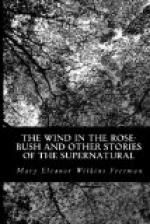“What is it? What is it, Sophia?” she gasped.
Sophia still stood with the handkerchief pressed to her face.
“Oh, Sophia, let me call somebody. Is your face hurt? Sophia, what is the matter with your face?” fairly shrieked Amanda.
Suddenly Sophia took the handkerchief from her face.
“Look at me, Amanda Gill,” she said in an awful voice.
Amanda looked, shrinking.
“What is it? Oh, what is it? You don’t look hurt. What is it, Sophia?”
“What do you see?”
“Why, I see you.”
“Me?”
“Yes, you. What did you think I would see?”
Sophia Gill looked at her sister. “Never as long as I live will I tell you what I thought you would see, and you must never ask me,” said she.
“Well, I never will, Sophia,” replied Amanda, half weeping with terror.
“You won’t try to sleep in that room again, Sophia?”
“No,” said Sophia; “and I am going to sell this house.”
THE VACANT LOT
When it became generally known in Townsend Centre that the Townsends were going to move to the city, there was great excitement and dismay. For the Townsends to move was about equivalent to the town’s moving. The Townsend ancestors had founded the village a hundred years ago. The first Townsend had kept a wayside hostelry for man and beast, known as the “Sign of the Leopard.” The sign-board, on which the leopard was painted a bright blue, was still extant, and prominently so, being nailed over the present Townsend’s front door. This Townsend, by name David, kept the village store. There had been no tavern since the railroad was built through Townsend Centre in his father’s day. Therefore the family, being ousted by the march of progress from their chosen employment, took up with a general country store as being the next thing to a country tavern, the principal difference consisting in the fact that all the guests were transients, never requiring bedchambers, securing their rest on the tops of sugar and flour barrels and codfish boxes, and their refreshment from stray nibblings at the stock in trade, to the profitless deplenishment of raisins and loaf sugar and crackers and cheese.
The flitting of the Townsends from the home of their ancestors was due to a sudden access of wealth from the death of a relative and the desire of Mrs. Townsend to secure better advantages for her son George, sixteen years old, in the way of education, and for her daughter Adrianna, ten years older, better matrimonial opportunities. However, this last inducement for leaving Townsend Centre was not openly stated, only ingeniously surmised by the neighbours.
“Sarah Townsend don’t think there’s anybody in Townsend Centre fit for her Adrianna to marry, and so she’s goin’ to take her to Boston to see if she can’t pick up somebody there,” they said. Then they wondered what Abel Lyons would do. He had been a humble suitor for Adrianna for years, but her mother had not approved, and Adrianna, who was dutiful, had repulsed him delicately and rather sadly. He was the only lover whom she had ever had, and she felt sorry and grateful; she was a plain, awkward girl, and had a patient recognition of the fact.




